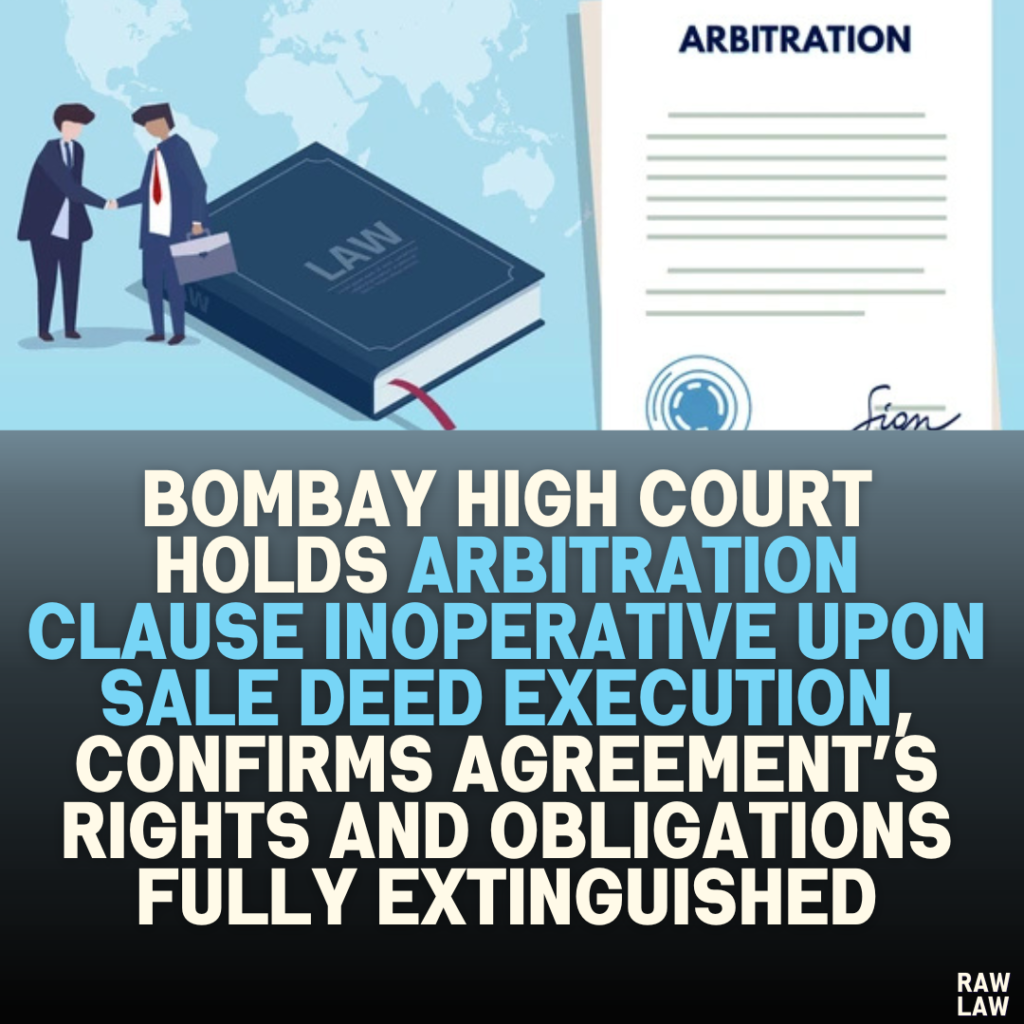Court’s Decision
The Bombay High Court dismissed the Arbitration Appeal, upholding the trial court’s order that rejected an application under Section 8 of the Arbitration and Conciliation Act, 1996. The court found that the arbitration clause in the agreement for sale ceased to have effect once the sale deed was executed, as the agreement was fully discharged and no longer legally effective.
Facts
The case involved multiple agreements between the parties, centering on the sale and joint development of property in Navi Mumbai. Initially, a Memorandum of Understanding (MoU) was signed, followed by a joint development agreement, and subsequently a registered agreement for sale. A conveyance deed was eventually executed, transferring ownership of the property. The respondents later filed a civil suit for declarations, injunctions, and specific performance related to the MoU and the allotment letter, claiming a 50% entitlement in the development project. The appellants filed an application to refer the suit to arbitration, citing an arbitration clause in the agreement for sale, which the trial court rejected.
Issues
- Whether the arbitration clause in the agreement for sale applies to the current disputes arising from the MoU and the allotment letter.
- Whether the execution of the sale deed extinguishes the arbitration clause in the agreement for sale.
Petitioner’s Arguments
The appellants argued that the agreement for sale, the MoU, and the allotment letter were interconnected and integral parts of a single transaction. They contended that the arbitration clause in the agreement for sale should govern all disputes arising from these related documents. Citing Supreme Court precedents, they argued that the trial court conducted an in-depth examination rather than a preliminary one, contrary to Section 8 of the Arbitration Act, which requires only a prima facie inquiry.
Respondent’s Arguments
The respondents contended that the agreement for sale and its arbitration clause became inoperative after the execution of the conveyance deed. They argued that the MoU and allotment letter formed separate and distinct agreements unrelated to the arbitration clause in the agreement for sale. The respondents also pointed out that the subject matter of the suit was the MoU and allotment letter, not the agreement for sale.
Analysis of the Law
The court considered the principles of contract law, particularly regarding the termination of contracts and arbitration clauses. Relying on Supreme Court judgments, it noted that arbitration clauses do not survive the execution of a conveyance deed if the agreement they are part of is discharged or substituted by a new contract. The court emphasized that the arbitration clause in the agreement for sale was specific to that document and did not extend to the independent MoU and allotment letter.
Precedent Analysis
The court cited several Supreme Court decisions, including Union of India v. Kishorilal Gupta & Bros., which held that an arbitration clause perishes if the contract containing it is substituted or fully performed. In NBCC (India) v. Zillion Infraprojects Pvt. Ltd., the court found that an arbitration clause must be explicitly referenced in subsequent agreements to remain enforceable. These precedents supported the court’s finding that the arbitration clause was not applicable to the MoU and allotment letter.
Court’s Reasoning
The court reasoned that once the sale deed was executed, the agreement for sale was fully performed, and all rights and obligations under it, including the arbitration clause, were extinguished. The court found no specific reference to the arbitration clause in the MoU or the allotment letter, confirming that these documents were independent agreements.
Conclusion
The court dismissed the appeal, affirming that the arbitration clause in the agreement for sale was inoperative following the execution of the sale deed. The court also dismissed the related interim application as moot.
Implications
This judgment underscores that arbitration clauses in contracts are limited to the scope and duration of the original agreement. Once a contract is discharged, any arbitration clause it contains typically ceases to be enforceable unless specifically incorporated into subsequent agreements. This decision provides clarity on the limits of arbitration clauses, especially in complex property transactions involving multiple interrelated agreements.




Pingback: Delhi High Court Upholds Seniority-Based Allotment, Dismisses Petition Citing Forged Documents and Lack of Procedural Violations - Raw Law